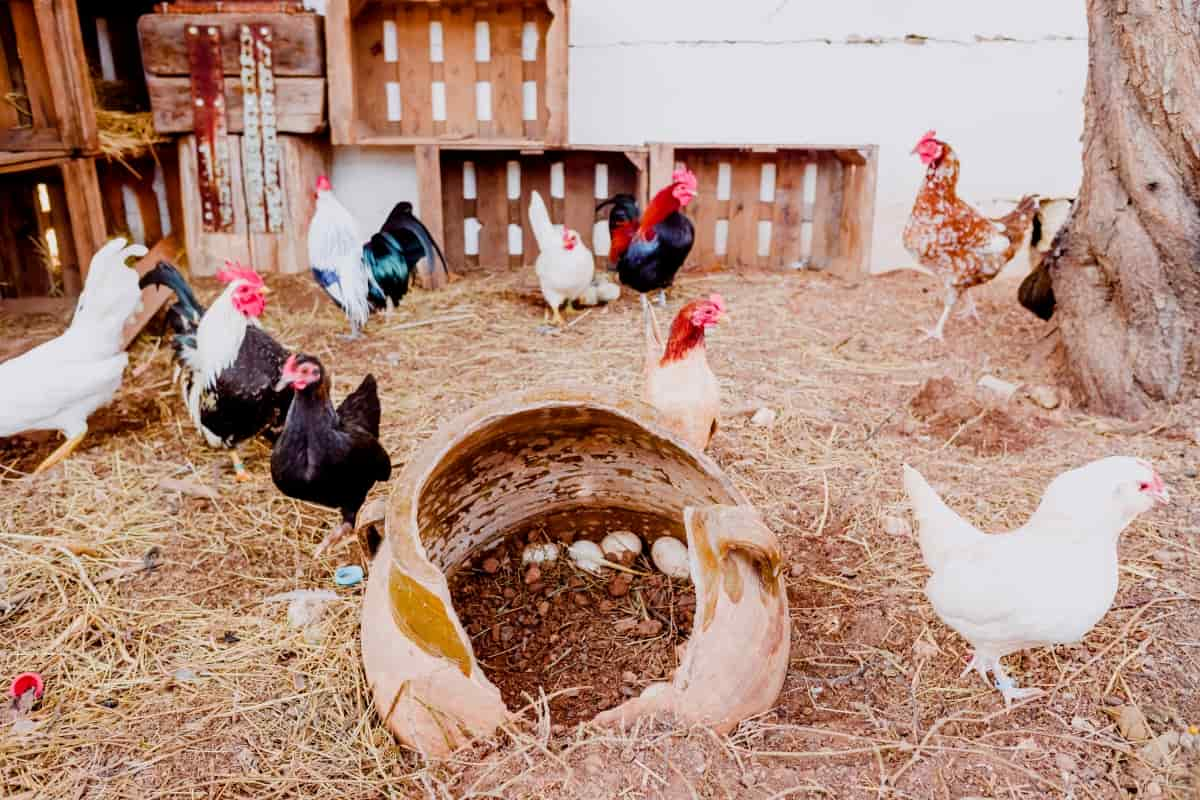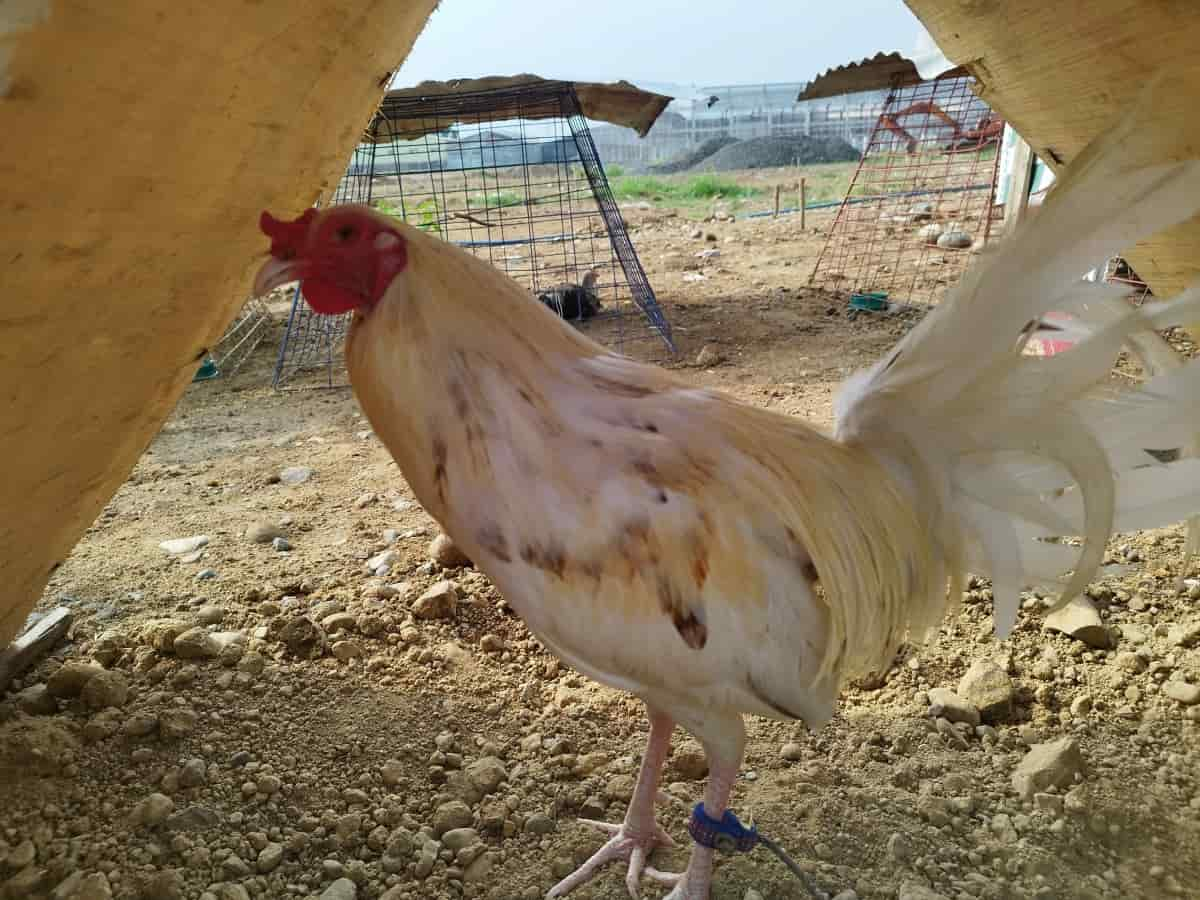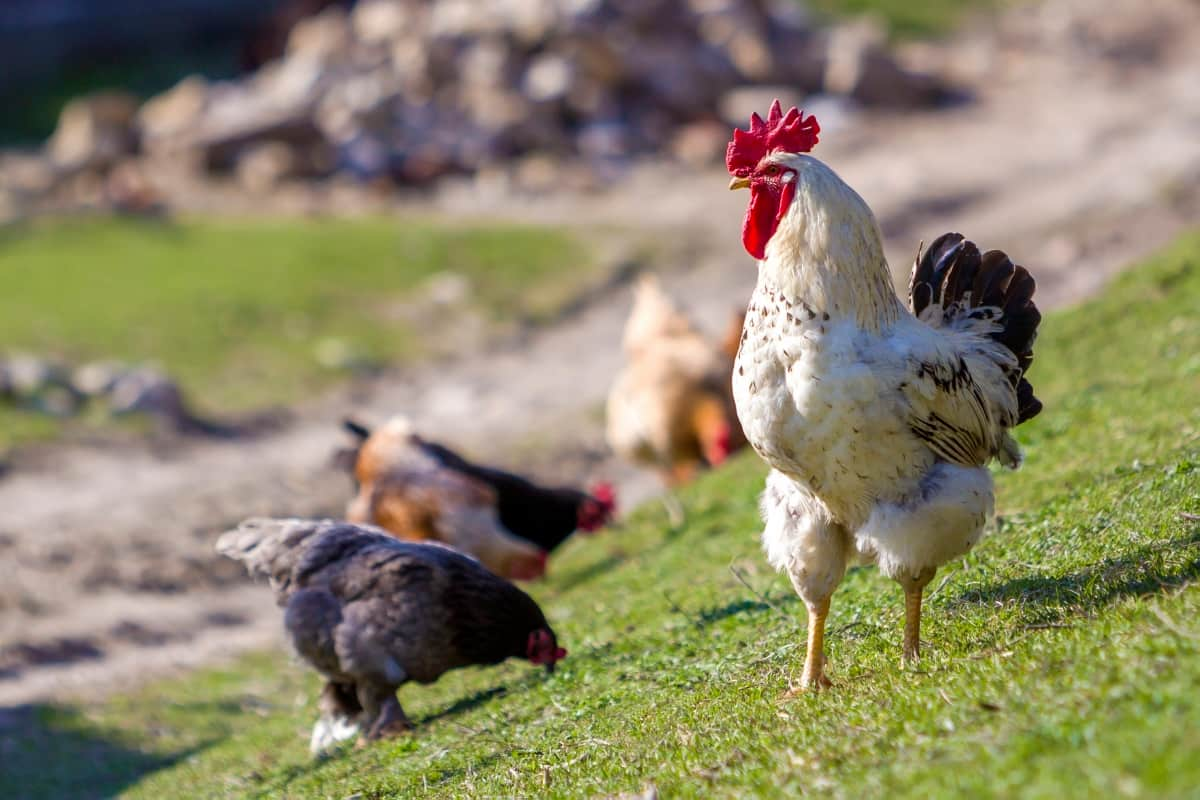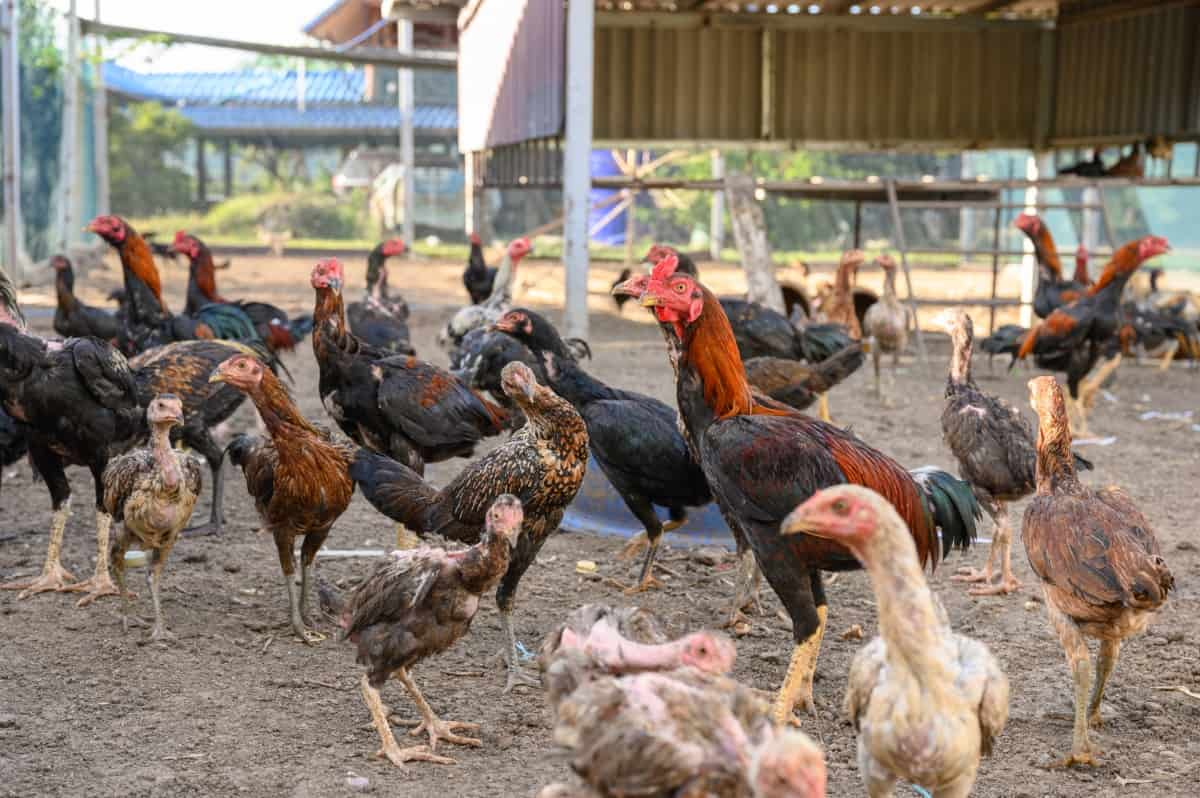Keeping a rooster in a flock and coop comes with a set of unique advantages and challenges. The role of a rooster in a flock is multifaceted, influencing aspects from egg fertilization to the protection of hens. While there are clear benefits of having a rooster with laying hens, such as improved flock dynamics and potential for natural incubation, there are also notable disadvantages of having a rooster, especially in residential areas where they might be illegal due to noise and aggression concerns.

This article explores various facets, including the pros and cons of roosters for fertilization purposes, their impact on egg production, and the challenges associated with rooster aggression, answering questions like “Can you keep a rooster with hens and still eat the eggs,” “how many roosters for 20 hens”, and “are hens happier with a rooster.”
Pros and Cons of Having a Rooster
Benefits of Having a Rooster
Having a rooster in a flock offers several benefits, especially in terms of social structure and protection. Roosters have a vital role in upholding the pecking hierarchy, thus fostering a more structured and less stressful atmosphere for the hens. This can lead to improved health and egg production. Additionally, roosters are vigilant protectors, often alerting and shielding their flock from predators.
When it comes to fertilization, a rooster ensures the continuation of the flock through natural reproduction, which is an essential aspect for those interested in sustaining their poultry population. They also contribute to the genetic diversity of the flock, which can result in stronger, more resilient birds. Moreover, many owners find the presence of a rooster, with their striking plumage and distinct crow, adds aesthetic value to the flock.
Drawbacks of Keeping a Rooster
The disadvantages of having a rooster are significant, particularly in urban or residential settings. Roosters are known for their early morning crows, which can be a major noise nuisance, leading to the question of why are roosters illegal in some areas. Their aggressive behavior is another concern, as they can be territorial and may attack other animals or even people, posing a risk, especially to children.
This aggression can sometimes extend to hens, causing them stress or physical harm. Furthermore, roosters require additional space and management. In terms of egg consumption, while you can keep a rooster with hens and still eat the eggs, the presence of a rooster means that some eggs may be fertilized, which requires careful collection to avoid incubation and hatching if egg consumption is the primary goal.
Advantages and Disadvantages of Roosters in a Flock
Integrating roosters into a flock brings both advantages and disadvantages. On the positive side, they can significantly reduce stress in hens by establishing a clear pecking order and providing protection against predators, potentially enhancing the flock’s overall well-being. Roosters also facilitate the natural breeding process, allowing for flock expansion and genetic diversity. However, the downsides include potential aggression, which can lead to injuries among hens or even people.
In case you missed it: Gentle Hens and Friendly Roosters: Discover the Top 10 Friendliest Chicken Breeds

Keeping more than the recommended ratio, like having more than one rooster for 20 hens, can lead to excess aggression and stress within the flock. Additionally, roosters may contribute to noise pollution, particularly in residential areas, leading to conflicts with neighbors and local regulations.
The Positive Impact of Roosters in a Chicken Coop
Roosters can have a significantly positive impact on a chicken coop’s dynamics. By nature, they are protective, often serving as sentinels and alerting the flock to potential dangers, thus providing a layer of defense against predators. This protective behavior can be particularly valuable in rural settings where threats like foxes are common.
In terms of breeding, a rooster’s presence ensures the possibility of fertilized eggs, paving the way for natural chick hatching and flock expansion. Additionally, many poultry enthusiasts appreciate the natural behavior and interaction that a rooster brings to a flock, enhancing the overall experience of keeping chickens.
Negative Aspects of Roosters in a Residential Setting
In a residential setting, the negative aspects of keeping roosters become more pronounced. The primary issue is their loud crowing, which can occur at any time of day but is most notable in the early mornings. This noise can lead to disturbances and complaints from neighbors, often being the reason why roosters are illegal in many urban and suburban areas.
Additionally, their territorial and sometimes aggressive behavior can pose a risk to pets, other animals, and even people, making them less suitable for residential environments. The need for extra space and specific management to handle these behaviors further complicates keeping roosters in such settings.
Pros and Cons of Roosters for Fertilization Purposes
When considering roosters for fertilization purposes, there are both pros and cons. On the positive side, roosters ensure the fertilization of eggs, which is essential for breeding and sustaining a flock. This allows for the natural hatching of chicks and the continuation of the flock’s lineage.
In case you missed it: Everything You Want to Know About the Sasso Chicken Breed

However, the downside is that when a rooster is present, egg collection must be more diligent to prevent unwanted hatching if the eggs are intended for consumption. Additionally, the introduction of a rooster for breeding purposes requires careful management to ensure the proper rooster-to-hen ratio, as too many roosters can lead to excessive competition and stress within the flock.
The Role of Roosters in Protecting the Flock
The role of a rooster in protecting the flock is one of their most significant contributions. Roosters are naturally vigilant and will often take a stand against predators, including foxes, to protect their hens. This protective behavior is crucial in rural settings where such threats are more prevalent. A rooster’s ability to sense danger and alert the flock can be a lifesaver, allowing hens to seek shelter. However, it’s important to note that while a rooster can deter some predators, they are not infallible, and additional protective measures may still be necessary.
Challenges Associated with Rooster Aggression
Rooster aggression is a notable challenge when keeping these birds. Roosters have the potential to be territorial and may display aggression towards other roosters, other animals, and even people. This can lead to injuries and stress within the flock, particularly if the rooster-to-hen ratio is not adequately managed.
The aggression can also extend towards hens, sometimes resulting in over-mating, which can harm the hens. Managing rooster aggression requires understanding their behavior, providing enough space, and possibly separating aggressive individuals to maintain a harmonious coop environment.
Benefits and Limitations of Natural Incubation by Roosters
Roosters play an indirect role in natural incubation by fertilizing the eggs, which hens can then incubate. The benefits of this natural process include the sustainability of the flock and the educational and experiential value of observing the life cycle.
However, there are limitations, as roosters do not physically incubate the eggs. This means that if hens are not inclined to brood, or if conditions are not conducive to successful hatching, fertilization by roosters may not result in successful chick development. Additionally, for those primarily interested in egg production for consumption, the presence of fertilized eggs can be a concern.
The Impact of Roosters on Egg Production
The impact of roosters on egg production is multifaceted. While the presence of a rooster does not directly increase the number of eggs laid by hens, it can influence the flock’s overall well-being. A well-managed rooster can help maintain a stable and less stressful environment for the hens, potentially leading to consistent egg production. However, if not managed properly, roosters can cause stress among hens through aggressive behavior, which can negatively affect their laying.
In case you missed it: Chicken Coop Deep Littering: How to Use it and Benefits

Additionally, the fertilization of eggs by roosters doesn’t impede the ability to eat these eggs. Still, it does require careful collection and handling to prevent the development of embryos if the eggs are not intended for hatching.
Conclusion
The decision to include a rooster in a flock requires careful consideration of both its benefits and challenges. Roosters can bring structure, protection, and the possibility of natural reproduction to a chicken coop, contributing positively to the flock’s dynamics and sustainability.
- Feed Your Flock for Less: Top 10 Tips to Save on Chicken Feed
- Ultimate Guide to Ossabaw Island Hog: Breeding, Raising, Diet, and Care
- Hatching Answers: The Top 10 Reasons Your Chickens Aren’t Laying Eggs
- Eggs and Economics: Breaking Down the Cost of Raising Backyard Chickens
- Defend Your Greens: Proven Methods to Keep Iguanas Out of Your Garden
- Ultimate Guide to Cinnamon Queen Chicken: A Comprehensive Guide for Beginners
- Ultimate Guide to California Tan Chicken: Breeding, Raising, Diet, Egg-Production and Care
- Ultimate Guide to Marsh Daisy Chicken: Breeding, Raising, Diet, and Care
- 10 Types of Chicken Farming Businesses You Can Start for Profits